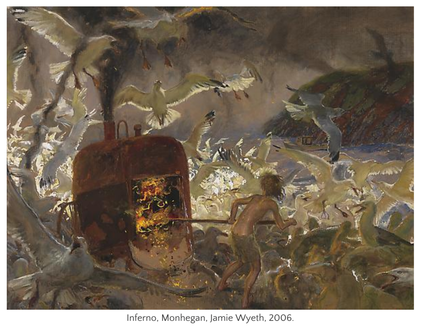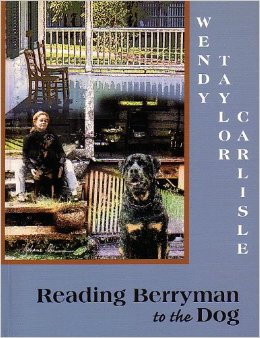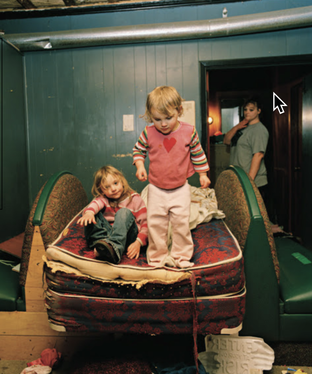POETRY
START A JOURNAL | INFERNO | READING BERRYMAN TO THE DOG | AMBER GOT HER GIRLS BACK | RADIO DAYS | SAINTS | NOTES ON FORGETTING | THE POEMS ESCHEWS THE SINCEREST STYLE | THE PHYSICAL WORLD | THE CIRCUS OF INCONSOLABLE LOSS | ON ART AND LITERATURE | THINGS BURN
|
START A JOURNAL
Poem by Wendy Taylor Carlisle Begin with evening on the bayou,
Black Jack in a Ball jar, borrowed Marlboro's. Describe the sound of the Atchafalaya, the yelp of hounds back in the swamp. Add bits of conversation, opinions on liars and politicians. Complain about Wall Street and the state of the art. Tell it all. Be brazen. How Mother calls on Sunday and you hate it. Share that part. Put a date on it—summer. Spill gin and tonic on the cover. Do this quick, before the light goes before the view narrows down to the creek bed, the water running away. Acornwhistle,
Pushcart Nomination, 1998 *The Atchafalaya is a Louisiana swamp. |
Listen to Wendy read START A JOURNAL
|
INFERNO
Poem by Wendy Taylor Carlisle
Poem by Wendy Taylor Carlisle
|
After “Inferno, Monhegan, 2006,” Jamie Weyeth. Wherever I halt amid the birds, their merciless red legs, sea-colored stare, before the cliff the eye, my eye, returns to specks of flame. Whatever I smell salt water, guano, garbage, rot, the rusty burner or decaying boat the smoke, a shadowed wing, returns to soot. And what I hear, tuned ear to scream the hubbub of those pirate gulls the roar of gas consumed is shriek and tide and bird sucked in to shore. The Bates boy and his oar feed fire’s mouth beside effulgent light, as if the sea had scavenged sun and spat it back into the foam below a corrugated sky its blue rubbed into gray by a flue-narrowed plume. The waves, the shoreline, heaps of junk, edges incarnate in a black-tipped wing and what returns is brimstone and a swallowing beak. |
The Ekphrastic Review, Feb 2016
|
READING BERRYMAN TO THE DOG
Poem by Wendy Taylor Carlisle People
say dogs have souls. I say they’re bloodthirsty
as generals. The new Rottweiler, one hundred pounds plus, treasures dried pig ears, hoards them like a recruit. After dinner, I can hear him in the garage, shattering them, chewing. The dog flew in on American Air with my sweaty shirt in his crate for the scent. Still, we were strangers when the front-end loader set him down on the tarmac, strangers when I first had to touch him and the day went slick in my hand. I grubbed in my pocket for a Ken'l Bone, crooned a safe-dog song. Years after Tet, I loved tall Marine who seldom spoke about the war. In Asia, he had friends and enemies he couldn't tell apart. In my bed, he dreamed of napalm and demolished night. Not at home yet, the new dog noses the furniture. Unsettled as a visitor at morning mass, he measures the cat’s intent with a long stare. In the manual it says, his breed is fond of small animals. They will, however, kill rabbits. After a decade gone, the soldier phoned. His voice made a fist sound in my ear. The receiver twisted in my palm. I listened to the familiar words; I didn’t hang up. Since then, he calls sometimes. Sometimes I answer. If I happen to cry, the dog stands close and waits for the all-clear sign. If he whines, I ache for him, take him out to the porch, let him drop his sad head on my foot and read to him from Berryman– the Opus Dei, the prayers—until he can finally sleep. Perihelion
Pushcart Nomination, 1999 |
Listen to Wendy read
READING BERRYMAN TO THE DOG |
AMBER GOT HER GIRLS BACK, AND NOW THEY LIVE IN THE ABANDONED RESTAURANT
Poem by Wendy Taylor Carlisle
Poem by Wendy Taylor Carlisle
|
Amber is watching her girls play in that forsaken greasy spoon. She has her hand on her neck, stroking the place where Craig’s fingers pressed down. The forest green sham wood paneling backgrounds the two toddlers who are oblivious, of course, jumping on their makeshift bed, a mattress propped between two booth seats. The bed’s yellow stuffing is exposed like cut fat in a surgery. The two, who don't notice their run down surroundings, are writing their own stories even at the second of this photograph—the pink shirt with the red heart is the baby’s favorite. She’ll remember it beating. Her sister will pass down worn jeans and the brown brogans to her. I always get the hand-me-downs, the baby will mew and she will always be the baby even after Amber presents her with a younger brother. They don’t know it now, capering on the dilapidated booth-bed but both girls will, in times of stress, adopt the same dreamy look their mother wears and go searching for their version of those wicked fingers and that green paneling which will turn out to be the wild woods of their grown-up adventure.
Arkana, Issue 1, November 2016
|
|
RADIO DAYS
Poem by Wendy Taylor Carlisle We’re in medias res and surprise!
it’s a dance floor— moonlight & motor trips, an intermezzo somewhere between the last dark jazz and be-bop with those boys who wore us out on their way to war and after led us to certain blues clubs with an easy sax background. This isn’t how I, for one, imagined the halfway point— that center field, that cheese in the chili relleno, that the thong part of the thong, the Kansas at the fulcrum of our lives, which lives rattle along now, an up-tempo Brill Building chorus, tuned in from the brown Crosley squatting at the center of mother’s counter Over the Rainbow. Dorsey. Louis. Never the songs that were “our” songs-- emblematic Everly Brothers shouts, the croon of thin Elvis in those lost Julys, midway between the end and the beginning of another misspent junior high school year, in the heart of that lost century. It’s a shock, this fox trot at the pivot point when what we expected was Fifty Cent or the Stones if not Phillip Glass and what we get, when we get it, is a melody like mom and dad’s bouncy, conventional, a middlin' tune. Cider Press Review, #8
|
Listen to Wendy read RADIO DAYS
|
|
SAINTS
Poem by Wendy Taylor Carlisle Vern is in the garden cultivating the fall cabbage in his brain. The tumor boils him
like coffee in a camp pot. Reddening trees know what comes next: the light rises and Sunday loses an hour. Up the hill, Paul fingers his snapshots of Woodstock while his gut fills with rust and grits bubble on his cook stove. It won’t be long now, says the Hospice lady. She says, only the good die young. You hear it all around. The good. The dead. Their stories fall from the trees. Here is a susurrus of longing for all of them and for Saint Bartholomew who is often rendered in oil paintings with his raw skin draped over one arm and Saint Christina the Astonishing, heroine of song, who flew up out of her coffin, come back from the dead to bring us hope. Most of us produce what we can in the hope direction. Vitamins, exercise, gardening but still the the18-wheeler appears, rises like another sun over the grill, for one second before impact gleams like God’s shield on your hood. Cider Press Review, #9
2009 |
Listen to Wendy read SAINTS
|
|
NOTES ON FORGETTING
Poem by Wendy Taylor Carlisle Family stories are a big part of why I distrust
my childhood, especially the part that disappeared since everything I remember happened before my hand was cut off or after I was seven and most of the surroundings have vanished and been replaced by worries about asbestos. Still, I can say how far a person will go to be singular, for example to Slidell, Louisiana where the two crackheads stole a donut truck and left a 15-mile trail of Krispy Crèmes for the police to follow, or how someone else might choose to actually eat a mile or two of crullers, filled long johns, sugar, cinnamon and chocolate-chocolate donuts in order to escape. I can explain how when that person wakes up fat in Mrs. Wright’s third grade, the ruler to the knuckles, the chair in the hall, face to the corner, visit to the principal all seem convincing new ways to play down the tedium of learning perfect cursive. But this is devolving into stories of childhood, a time which, as I said, I detest and which I have tuned out like a fuzzy FM station so as to have the music the way I want it. I tell myself this in the shorthand relatives use to lie about casaba or the maid’s splayed feet, the endless insect humming, not to mention the sun on a Percheron’s back or how the legs of a child on that horse might stick out almost horizontal over the furrows as the Portuguese farmers plow. When I hear stories like this, I grow more alert, more nervous with each passing sentence, as plum blossoms pink over hindsight’s clipped lawn, as memory struggles with fable to shape a more perfect line. Redheaded Stepchild, November 2008
|
Listen to Wendy read NOTES ON FORGETTING
|
|
THE POEM ESCHEWS THE SINCEREST STYLE
Poem by Wendy Taylor Carlisle When the poem comes to say what it knows about the suprasternal notch, it stops.
The pale hairs curling back against the skin are far too private a detail to render. The poem vowed months ago never to speak of its erotic life again. Today’s suitable topics do not include the weight of flesh in the palm. The poem shuns also the plane tree and fig for surely alluring fruit poisons the page where a fir can never whisper or willow weep. And what of the moon, the breast-pink oleander and lupine the color of the edge of daylight—all of nature lit from within like a de la Tour painting? The poem shrugs and shuffles away from the lake and the ginger daylilies, the pelt of moss on a park bench. It can only surreptitiously admire a hip, an elbow, must eschew the eyes as too close to tears, too skewed to the heartfelt which the poem has to admit it can no longer abide. A reader might imagine the poem looks better with its clothes off but that is another poem altogether and one that concerns itself with sweat, that can only be alluded to here, where the poem attends to its cartoon nature and, dressed like Doris Day, waits for a plane, reapplies mascara and adds to its list of unsuitable topics which now include the Alps, restaurants with linen table cloths, and all of Italy. The poem must also drive away from metaphor, which grows smaller and smaller in its rearview mirror. Thirty years ago, a poem could lie in bed all day moaning, Heart! Heart! And then break. Today, the moon-free poem has no vernacular for longing. It is a dream of itself in which a lover, if he arrives, comes too late. Poem Home, Anthology
|
Listen to Wendy read
THE POEM ESCHEWS THE SINCEREST STYLE |
|
THE PHYSICAL WORLD
Poem by Wendy Taylor Carlisle Indian classical singer...'jumps to death.'
Headline: Independent Bangladesh the truth, the feet, the drought under the spring mud the woman. The greatest poverty is not to live in a physical world, says Stevens. Fact is our teeth will outlast us and this year’s grain rots in our bellies while we live on in the dullness of matter. Hunger that sticks to your fur blooms elsewhere. We have only to consider a beautiful singer, ask what the roof knows, what the rain knows what the dirt knows, now. A River and Sound Review, Vol. 1
|
Listen to Wendy read THE PHYSICAL WORLD
|
|
THE CIRCUS OF INCONSOLABLE LOSS
Poem by Wendy Taylor Carlisle There is only one ring for those sweating horses with the preternaturally flat
backs and the fat smooth rumps from which ladies in stained tights vault on- to the sawdust or another horse. Only one ring for the hung-over clowns and their Volkswagen, a car so old it must be pushed into the one ring which is also the one for the acrobats and the tigers and contortionists and dogs that walk on their hind legs, then stop to scratch their necks, itchy under spangled ruffs. Above them wire walkers and trapeze guys swing, mayfly-graceful. Under them, the one ring reminds the audience to celebrate, each in their own constrained and special way, the emptiness they’ve come to in the spaces where other rings should be. Rattle #32, Winter 2009
Tribute to the Sonnet |
Listen to Wendy read
THE CIRCUS OF INCONSOLABLE LOSS |
ON ART AND LITERATURE
Poem by Wendy Taylor Carlisle
Poem by Wendy Taylor Carlisle
1. Fairy Tales Now
Don’t use the word tower or the word magic
Don’t use stepmother or roses
Or red, red lips or tragic
Don’t describe the woods
Don’t throw their braid out the window,
Don't climb the vine or the glass mountain,
Could have a vampire, but never
Describe the river unless somebody drowns.
2. Reading Prose
You will have to go through it, of course,
Organizing your disappointment
Like Bachelard, searching
For the beautiful, the sudden
Flash of poetry, hoping
To find at last a chapter
Large enough to hold
Your capacious disinterest.
Don’t use the word tower or the word magic
Don’t use stepmother or roses
Or red, red lips or tragic
Don’t describe the woods
Don’t throw their braid out the window,
Don't climb the vine or the glass mountain,
Could have a vampire, but never
Describe the river unless somebody drowns.
2. Reading Prose
You will have to go through it, of course,
Organizing your disappointment
Like Bachelard, searching
For the beautiful, the sudden
Flash of poetry, hoping
To find at last a chapter
Large enough to hold
Your capacious disinterest.
Bone Bouquet
|
THINGS BURN
Poem by Wendy Taylor Carlisle Because everything was sex then
she called all looks to herself: men after a night of drinking, boys just past the ball field shout, the yielding dust in corners. Because her hair was a red cape the street filled with bulls. *** Because things burn, their skin was permeable, heat passing between them while the sun crawled into the world’s basement to spend another short night. Because he was swelter, her dark bloomed neon and sweat. *** Because rain is always present in the hollow bones of the dead and turns the ground to paste on her boots she shelters in empty rooms. Because she touches herself then, she finds a hidden knot of madness, the fire’s other flame. Southern Women's Review
|
Listen to Wendy read THINGS BURN
|



